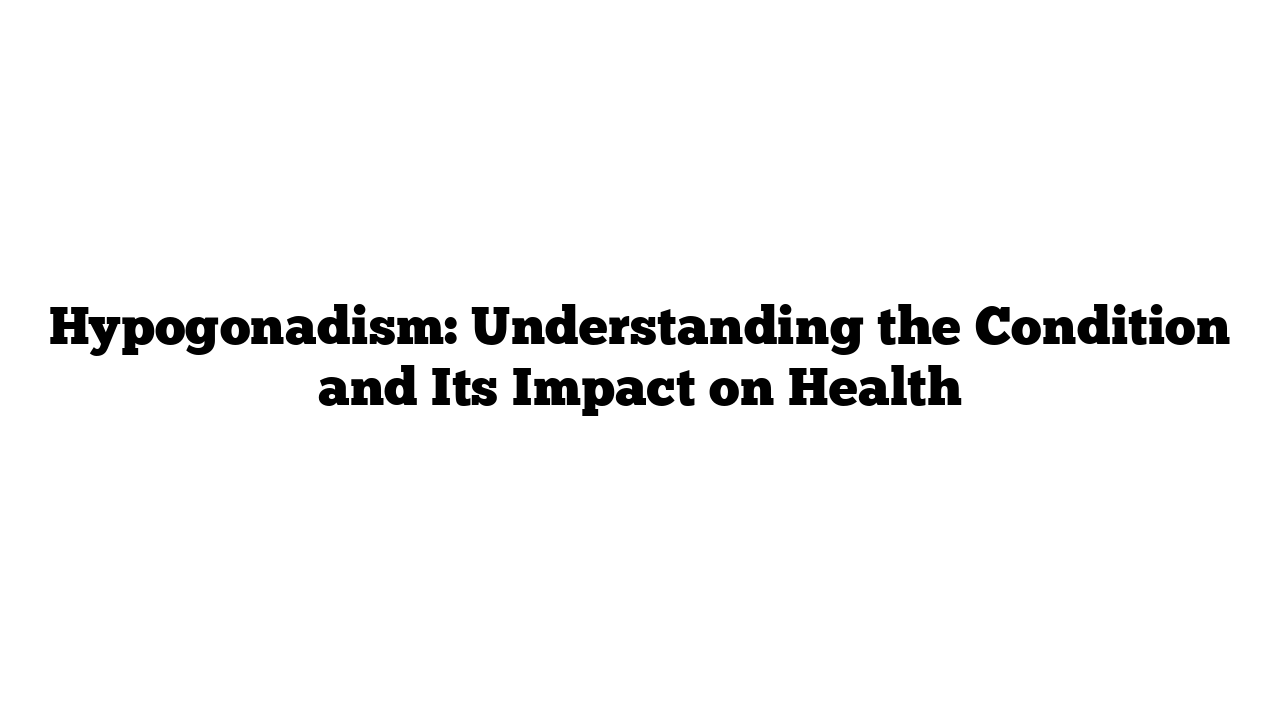Hypogonadism is a condition characterized by the body’s inability to produce enough hormones, specifically testosterone in men and estrogen or progesterone in women. These hormones are vital for growth, development, and overall health.
This article dives into the causes, symptoms, treatments, and lifestyle adjustments necessary for managing hypogonadism effectively.
What Is Hypogonadism?
Hypogonadism occurs when the gonads (testes in men and ovaries in women) produce insufficient levels of hormones. This can affect fertility, sexual function, and overall well-being. It’s classified into two main types:
- Primary Hypogonadism: The issue originates from the gonads themselves.
- Secondary Hypogonadism: The problem lies in the hypothalamus or pituitary gland, which controls hormone production.
Causes of Hypogonadism
Primary Causes
- Genetic disorders like Klinefelter syndrome or Turner syndrome
- Injury to the gonads
- Cancer treatments, including chemotherapy or radiation
- Autoimmune diseases
Secondary Causes
- Pituitary gland tumors or damage
- Chronic illnesses such as diabetes
- Obesity
- Excessive use of steroids or opioids
Fun Fact: A 2022 study in the USA showed that nearly 4 million men over the age of 45 are affected by low testosterone levels.
Recognizing the Symptoms
In Men
- Decreased libido
- Erectile dysfunction
- Loss of muscle mass
- Fatigue and depression
- Infertility
In Women
- Irregular menstrual cycles
- Hot flashes
- Loss of bone density
- Vaginal dryness
- Reduced sexual desire
If these symptoms persist, consulting a healthcare provider is essential. Visit medicaltimes.io for detailed insights and tips.
Diagnosing Hypogonadism
Doctors use blood tests to measure hormone levels. Other diagnostic tools include:
- Imaging tests like MRI or CT scans to detect pituitary gland abnormalities
- Genetic testing for hereditary causes
Treatment Options
Hormone Replacement Therapy (HRT)
- For Men: Testosterone replacement through gels, patches, or injections
- For Women: Estrogen and progesterone therapy
Medications
- Clomiphene or hCG for stimulating hormone production
- Aromatase inhibitors for specific cases
Lifestyle Changes
- Healthy Diet: Include foods rich in zinc and vitamin D
- Regular Exercise: Strength training can boost testosterone naturally
- Weight Management: Losing excess weight improves hormone balance
Living With Hypogonadism
Living with hypogonadism can be challenging, but proper management improves quality of life. It’s crucial to:
- Maintain regular medical check-ups
- Monitor bone density to prevent osteoporosis
- Address mental health issues like depression
Can Hypogonadism Be Prevented?
While genetic causes are unavoidable, secondary hypogonadism can often be prevented by:
- Avoiding substance abuse
- Managing stress
- Maintaining a balanced lifestyle
Top 3 Reference Links
- Mayo Clinic: Hypogonadism Overview
- Cleveland Clinic: Causes and Symptoms of Hypogonadism
- Endocrine Society: Hormone Health Network
FAQs: Frequently Asked Questions
- What is hypogonadism?
Hypogonadism is a condition where the body doesn’t produce enough sex hormones like testosterone or estrogen. - Can hypogonadism affect fertility?
Yes, it often leads to infertility due to low hormone levels affecting sperm or egg production. - How is hypogonadism diagnosed?
Blood tests, imaging studies, and genetic testing are commonly used for diagnosis. - Is hypogonadism curable?
While it’s not always curable, it can be effectively managed with treatment and lifestyle changes. - Can women develop hypogonadism?
Yes, women can experience hypogonadism, especially during menopause or due to medical conditions. - What are the risks of untreated hypogonadism?
Risks include osteoporosis, cardiovascular issues, and reduced quality of life. - Does age affect hypogonadism?
Yes, aging increases the likelihood of hormone decline, especially in men. - Are there natural ways to boost hormones?
Eating a balanced diet, exercising, and reducing stress can help improve hormone levels naturally. - What role does the pituitary gland play in hypogonadism?
It controls hormone signals; any damage or dysfunction can cause secondary hypogonadism. - Is hypogonadism common in the USA?
Yes, millions of adults in the USA experience hormone imbalances linked to hypogonadism.
